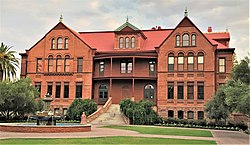A request that this article title be changed to Biodesign Institute is under discussion . Please do not move this article until the discussion is closed. |
This article has multiple issues. Please help improve it or discuss these issues on the talk page . (Learn how and when to remove these messages)
|
| ASU Biodesign Institute | |
|---|---|
 | |
 Interactive map of the ASU Biodesign Institute area | |
| General information | |
| Type | Research Institute |
| Location | Arizona State University: Tempe Campus, 727 E. Tyler St. Tempe, Arizona 85287 |
| Coordinates | 33°25′10″N111°55′41″W / 33.41944°N 111.92806°W |
| Construction started | Building A – February 2003 Building B – March 2004 Building C – October 2016 Building D – TBD |
| Completed | Building A – January 2005 Building B – January 2006 Building C – September 2018 Building D – TBD |
| Cost | Building A – $72.8 million Building B – $78.5 million Building C – $120 million Building D – TBD |
| Owner | Arizona State University |
| Technical details | |
| Structural system | Brick and glass curtain wall system, steel frame, concrete flooring |
| Floor count | 6 |
| Floor area | Building A – 183,220 s.f. Building B – 179,800 s.f Building C – 191,035 s.f. Building D – TBD |
| Design and construction | |
| Architecture firm | Buildings A & B – Gould Evans / Lord Aeck & Sargent Building C – ZGF Architects / BWS Architects Building D – TBD |
| Main contractor | Buildings A & B – DPR Construction / Sundt Corp. Building C – McCarthy Construction Building D – TBD |
| Awards and prizes | Building A – Gold-level LEED certified Building B – Platinum-level LEED certified Building C – TBD |
| Website | |
| biodesign.asu.edu | |
| Building A https://fdm-apps.asu.edu/UFRM/FDS/FacilityData.aspx?bNum=104A Building B https://fdm-apps.asu.edu/UFRM/FDS/FacilityData.aspx?bNum=104B Building C https://fdm-apps.asu.edu/UFRM/FDS/FacilityData.aspx?bNum=104C | |
The Biodesign Institute is a major research center known for nature-inspired solutions to global health, sustainability, and security challenges located on the Tempe campus of Arizona State University. The institute is organized into a growing number of collaborative research centers and laboratories staffed by scientists in diverse disciplines. It is currently led by Executive Director Dr. Joshua LaBaer, a personalized diagnostics researcher. [1]




